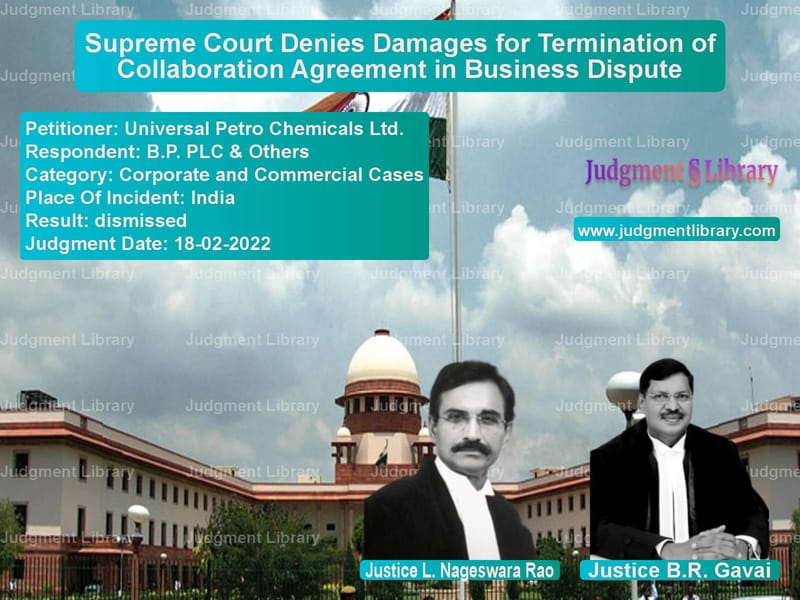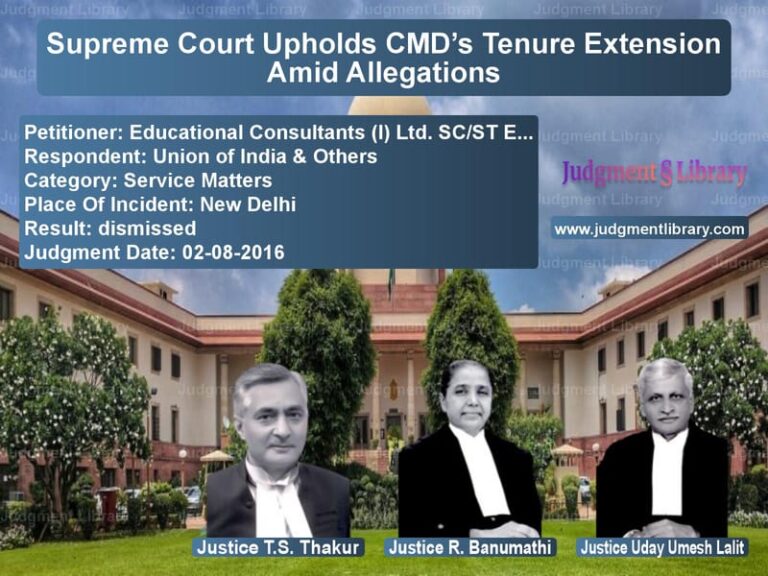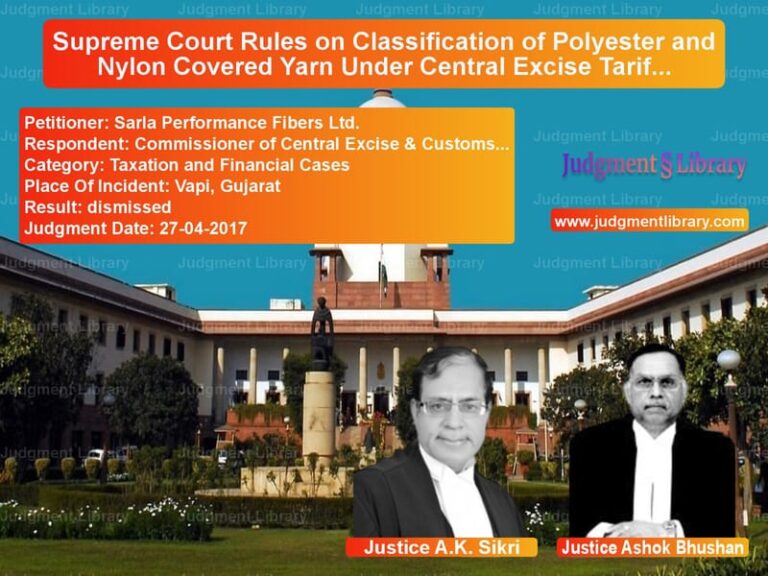Supreme Court Denies Damages for Termination of Collaboration Agreement in Business Dispute
The Supreme Court, in Universal Petro Chemicals Ltd. vs. B.P. PLC & Others, addressed the issue of whether damages could be awarded in a case where a collaboration agreement was terminated before its extended expiration date. The case revolved around the enforcement of a commercial contract and the relief available when specific performance is not granted.
Background of the Case
Universal Petro Chemicals Ltd. (the appellant) entered into a Collaboration Agreement on 01 November 1994 with Aral Aktiengesellschaft (Respondent No.3), a German company. The agreement granted the appellant the exclusive license to manufacture, blend, rebrand, and market ‘Aral’ lubricants in India. The agreement was subject to approval from the Reserve Bank of India (RBI), which was obtained on 25 November 1994.
In 2002, Veba Oil, the parent company of Respondent No.3, was acquired by B.P. PLC (Respondent No.1), the holding company of Castrol India Ltd. (Respondent No.2). The agreement was extended through a supplementary agreement dated 27 December 2002, based on government approval. However, on 14 April 2004, Respondent No.3 issued a termination notice stating that the agreement would end on 31 October 2004.
Challenging the termination, the appellant filed a suit for specific performance and injunction before the Calcutta High Court. The learned Single Judge denied specific performance but granted an injunction restraining the respondents from marketing Aral lubricants in India through any other party. Both parties appealed the decision.
Arguments by the Parties
Petitioner’s Arguments (Universal Petro Chemicals Ltd.)
- The Collaboration Agreement had been extended until 31 December 2009 through a supplementary agreement.
- The RBI approval granted in 2002 confirmed the extended duration of the agreement.
- The termination notice issued in 2004 was in violation of the contract’s extended duration.
- The respondents engaged in a conspiracy to procure the termination of the agreement, breaching contractual obligations.
- Even though specific performance could not be granted after 2009, damages should be awarded for the loss suffered between 2005 and 2009.
Respondent’s Arguments (B.P. PLC & Others)
- The Collaboration Agreement was subject to termination under Clause 5, which allowed either party to terminate after three years with six months’ notice.
- The RBI’s approval only extended royalty payments and did not alter the termination provisions.
- There was no conspiracy to terminate the agreement; the decision was purely economic.
- The appellant failed to plead for damages in the original suit and could not claim them at a later stage.
- As per the Specific Relief Act, compensation cannot be granted when no claim was made in the plaint.
Supreme Court’s Key Observations
1. Termination of the Collaboration Agreement
The Court analyzed whether the agreement was valid until 2009 and found:
“The Collaboration Agreement included a termination clause allowing either party to end the contract with six months’ notice. The supplementary agreement and RBI approval did not alter this fundamental right.”
2. Injunction Against the Respondents
The Court upheld the injunction granted by the High Court, preventing Respondent No.3 from marketing ‘Aral’ lubricants in India through any other party until 31 December 2009.
3. No Grounds for Awarding Damages
The appellant sought damages for the period between 2005 and 2009, arguing that the termination was wrongful. The Court, however, ruled:
“The appellant did not claim damages in the original suit or in subsequent appeals. Section 21(5) of the Specific Relief Act bars the award of damages unless explicitly claimed.”
4. No Amendment of Pleadings at a Late Stage
The Court rejected the argument that it could award damages even without a specific claim in the pleadings:
“The plaintiff had multiple opportunities to amend its pleadings to include damages but chose not to do so. The Court cannot assume reliefs not sought.”
5. Prior Precedents on Compensation
The Court distinguished the present case from previous rulings where compensation was awarded:
- In Jagdish Singh vs. Natthu Singh, compensation was granted because the property value was ascertainable, unlike the speculative damages claimed in this case.
- In Shamsu Suhara Beevi vs. G. Alex, the Court held that damages cannot be granted if not pleaded in the plaint.
Final Judgment
The Supreme Court ruled as follows:
- The appeal by Universal Petro Chemicals Ltd. was dismissed.
- The injunction against Respondent No.3 from marketing ‘Aral’ lubricants through others in India until 31 December 2009 was upheld.
- No damages were awarded due to the absence of a specific claim.
Impact of the Judgment
This ruling has significant implications for contract law and commercial litigation:
- Reaffirms the principle of termination clauses: Contractual terms governing termination will be upheld unless explicitly modified.
- Clarifies the requirement for claiming damages: A party must explicitly plead damages in its original suit to be eligible for compensation.
- Upholds procedural discipline in litigation: The judgment prevents litigants from introducing new claims at an appellate stage.
- Ensures fair business practices: Prevents companies from unfairly using injunctions to prolong commercial agreements beyond their agreed duration.
The Supreme Court’s decision reinforces contractual certainty and the necessity of proper pleadings in commercial disputes.
Petitioner Name: Universal Petro Chemicals Ltd..Respondent Name: B.P. PLC & Others.Judgment By: Justice L. Nageswara Rao, Justice B.R. Gavai.Place Of Incident: India.Judgment Date: 18-02-2022.
Don’t miss out on the full details! Download the complete judgment in PDF format below and gain valuable insights instantly!
Download Judgment: universal-petro-chem-vs-b.p.-plc-&-others-supreme-court-of-india-judgment-dated-18-02-2022.pdf
Directly Download Judgment: Directly download this Judgment
See all petitions in Company Law
See all petitions in Corporate Compliance
See all petitions in Contract Disputes
See all petitions in Judgment by L. Nageswara Rao
See all petitions in Judgment by B R Gavai
See all petitions in dismissed
See all petitions in supreme court of India judgments February 2022
See all petitions in 2022 judgments
See all posts in Corporate and Commercial Cases Category
See all allowed petitions in Corporate and Commercial Cases Category
See all Dismissed petitions in Corporate and Commercial Cases Category
See all partially allowed petitions in Corporate and Commercial Cases Category







